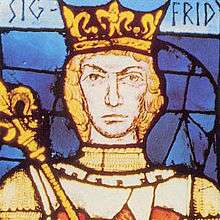Sigfried, Count of the Ardennes
| Sigfried | |
|---|---|
 Sigfried, Count of the Ardennes | |
| Spouse(s) | Hedwig of Nordgau |
| Noble family | House of Luxembourg |
| Father | Wigeric of Lotharingia |
| Mother | Cunigunda |
| Born | c. 922 |
| Died | 28 October 998 |
Sigfried (or Siegfried) (c. 922 – 28 October 998) was count of the Ardennes and the first person to rule Luxembourg. He was an advocate of the abbeys of Saint-Maximin de Trêves and Saint-Willibrord d'Echternach. He may have been the son of Count Palatine Wigeric of Lotharingia and Cunigunda. He was the founder of the House of Luxembourg, a branch of the House of Ardennes.
Lands
Siegfried held possessions from his father in Upper Lorraine. Although his title of "count" is not disputed, the extent of the lands he possessed remains unclear.[1]:19 From 958, he sought to acquire the territories of Count Warner in the region of Bodeux near the Benedictine Abbey of Stavelot. However, the Abbot of Stavelot, Werinfried, reluctant to have an ambitious landowner as his neighbor, acquired the village of Bodeux himself in 959.[1]:19
As Siegfried's ambitions to expand towards the Meuse River had failed, and as he was unwilling to confront the powerful episcopal cities of Trier or Metz, which ruled out expanding towards the Moselle River, he turned his attention towards the Alzette valley.[1]:19
Acquisition of "Lucilinburhuc" (Luxembourg)
In the mid-10th century, Siegfried acquired the rocky promontory known as Lucilinburhuc and its immediate surrounding area, as well as usage rights for the river from the Abbey of Saint-Maximin in Trier; this was in exchange for land he owned near Feulen.[1]:19 The deed for the exchange was not drawn up until 987; although the plots of land involved were tiny, the transaction was evidently a significant one, for the document bears the seals of Bruno, archbishop of Cologne and brother of emperor Otto I; Henry, archbishop of Trier; and Frederick I, Duke of Upper Lorraine, who was Siegfried's brother.[1]:20
In 963 Siegfried built a stronghold, a castellum Lucilinburhuc, around which a town started to grow. The structure may have been a refurbishment of an existing building.[1]:20 Siegfried gradually extended his territory towards the west, avoiding the Abbey's lands and those of the emperor.[1]:20
Though Siegfried used the title of count, the title "count of Luxembourg" was only applied to William some 150 years later.
Siegfried remained a loyal servant of the Holy Roman Emperors. At the death of Otto II in 983, Siegfried fought at the side of the widowed Empress consort and regent Theophanu against the ambitions of Lothair of France.[1]:20
Around 950, he married Hedwig of Nordgau (937–992), daughter of Eberhard IV of Nordgau. They had the following issue:
- Henry I of Luxembourg
- Siegfried, cited in 985
- Frederick I, Count of Salm and Luxembourg, married Ermentrude of Gleiberg, daughter of Heribert I, Count of Gleiberg and Ermentrud (Imizi).
- Dietrich II, bishop of Metz, 1006-1047
- Adalberon, canon of Trier
- Gislebert (d.1004), count in the Moselgau
- Cunigunda, married Henry II, Holy Roman Emperor
- Eve, married Gerard, Count of Metz
- Ermentrude, abbess
- Luitgarde, married Arnulf, Count of Holland
- a daughter, married Thietmar
References
Sources
- Kreins, Jean-Marie (2007). Histoire du Luxembourg: des origines à nos jours. Presses universitaires de France. ISBN 978-2-13-056367-9.
|